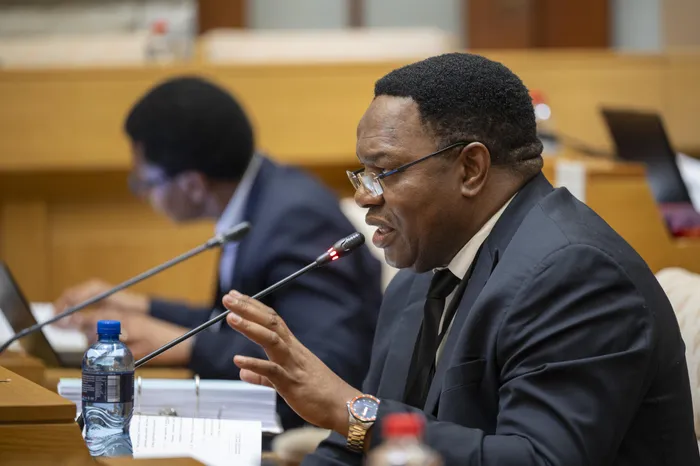
SAPS commissioner General Fannie Masemola testifying before the parliamentary inquiry probing the allegations made by KwaZulu-Natal police commissioner, Lieutenant-General Nhlanhla Mkhwanazi.
Image: Picture: Armand Hough
National Police Commissioner, General Fannie Masemola on Thursday said the December 2024 directive of Police Minister Senzo Mchunu to disband the Political Killings Task Team (PKTT) was "suspicious and questionable".
“With time it proved the motive of the directive was not necessarily simply closure of the team. It was an act directed to make sure the operations in Gauteng were scrambled and could not proceed,” Masemola said.
He made the statement when he was responding on Thursday during his testimony at the parliamentary inquiry probing the allegations made by KwaZulu-Natal police commissioner, Lieutenant-General Nhlanhla Mkhwanazi.
The inquiry was established to probe the unlawful dissolution of the PKTT, the freezing of filling vacancies within Crime Intelligence and alleged corruption by senior leaders in SAPS, public and political interference in the work of the police.
Masemola told the inquiry that he became aware of Mchunu’s directive on January 2 this year, just two days after it was signed.
It was days after he had spent a week with Mchunu, who did not express his unhappiness with the PKTT nor indicate his intention to disband it.
“I was shocked and surprised. For such serious and strategic issues, the timing and manner were very strange,” he said.
However, Masemola said after controversial businessman Vusimuzi 'Cat' Matlala was arrested a few months ago, a cellphone was found in his possession while in prison and the PKTT made them aware that they had found messages on his phone that indicated the real motive behind the disbandment of the team.
He stated that the move to disband the PKTT was definitely to circumvent investigations in Gauteng.
“It was to circumvent the arrest of Matlala and others.”
Masemola earlier told the inquiry that he opposed the immediate disbandment of the PKTT and preferred it to be wound down.
He had even escalated the matter to President Cyril Ramaphosa after his repeated attempts to get Mchunu to provide reasons were unsuccessful.
According to the national commissioner, Ramaphosa told him that he did not know why the team was disbanded and had undertaken to speak to Mchunu about this.
“The impression was that he did not know abut the matter. Of course, I don’t expect him to know. It is much more of operational matter.”
He also said that Ramaphosa seemed surprised and shocked when he informed about the disbandment.
“He was taken aback, sort of.”
The PKTT had been allocated 612 dockets as at the end of February 2025.
A total of 125 were under investigation, nine were unfounded, 10 pending a decision of the Director of Public Prosecutions, 114 were in court, 57 had been withdrawn and 217 finalised.
Masemola said the PKTT, a multi-disciplinary team that was prosecution-driven and was established in KZN, assisted in deterring political murders.
“They were successful with investigations and bringing people who committed murders to account.”
Responding to Chief Evidence leader, Advocate Norman Arendse, SC, Masemola said the IMC (Inter-Ministerial Committee) was satisfied with the work of the team.
“There were no concerns raised,” he said.
Masemola revealed that when it was disbanded, Mchunu had been aware of its existence but not on its activities.
“It is one of the briefings that were outstanding.”
He also said he had spent almost a week with Mchunu before he issued his directive.
“The minister never said anything about his unhappiness about the team and about his intention to disband it.”
Masemola said Mkhwanazi had contacted him while he was on leave as Mkhwanazi was concerned that the team had been disbanded.
On his return from his leave, his deputy Shadrack Sibiya had presented him with a draft letter requesting his signature to implement the directive of the disbandment of the PKTT.
“I indicated to him I am not in agreement with this directive on immediate disbandment and if ever it was to be disbanded, there should be phased winding down approach.”
He said repeated attempts to get reasons from Mchunu did not yield results.
“I made sure every time (we spoke) I asked what is the reason for his decision. He could not give the reasons.”
It was only a month or so later that Mchunu gave a reason - saying that political killings were happening prior to 1994 and currently, murders were taking place and there was no need for a specific task team to look at politically related murders.
mayibongwe.maqhina@inl.co.za